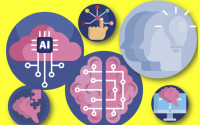
Engagement in cloud-supported collaborative learning and student knowledge construction: a modeling study
Many universities, especially in low-income countries, have considered the potential of cloud-supported collaborative learning in planning and managing students’ learning experiences. This is because cloud tools can offer students the necessary skills for collaboration with one another and improving communication between all users. This study examined how cloud tools can help students engage in reflective […]
















